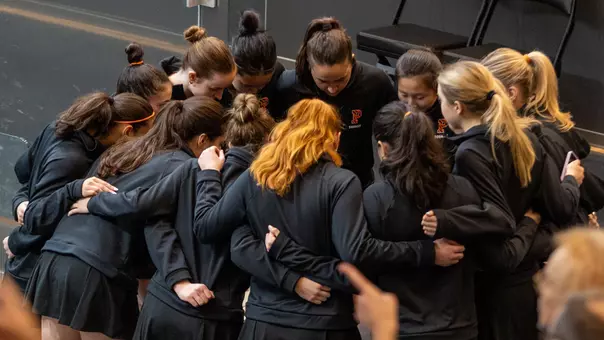
Julia Beaver '01: From Princeton Squash Success to Helping the Fight Against Cancer
6/4/2020
During her time with the Princeton squash program, there were a lot of happy days for Julia Beaver ’01 and her teammates, and in her professional career away from the court, she’s helping to ensure that countless others have more happy days of their own.
A three-time champion of the national individual tournament named since 2002 for Princeton’s coach then and now, Gail Ramsay, Beaver also helped Princeton win two team national titles. She went on to medical school at Penn, followed by a residency and fellowship at Johns Hopkins.
“I always knew I wanted to go to medical school,” Beaver said. “(At Princeton), I did research in oncology-type basic science, and in medical school, I was very interested in oncology and novel therapies for treatment of patients with cancer. I felt there was such an unmet need there, and I also was really fascinated by the first molecular underpinnings of cancer and the potential of novel therapies to treat cancer.”
Since 2013, Beaver has worked at the U.S. Food and Drug Administration, three years ago becoming the director of the Division of Oncology 1. Her division focuses on the regulation of drugs and drug approval for patients with breast cancer, genitourinary cancers, and gynecologic malignancies.
“(At the FDA), you’re able to work on translational drug development, although from the other side of the table,” Beaver said. “You’re not the one doing the clinical trials, but you’re really advising and providing a lot of input and feedback on how to successfully develop drugs to treat patients with cancer. I thought that would be a really meaningful place and a good fit with my interest and background in translational science and also interest in supporting the greater public health of patients with cancer.”
Just as she has been able to see her professional goals through, her success on the squash court put her in rare company. She was the third Princetonian, and only the fifth player in tournament history, to win at least three individual national titles, and only two players have accomplished the feat in the years since. Princeton’s Wendy Zaharko ’75 was the first, winning her third title in 1975 in the 11th year of the event. Future Princeton coach Ramsay was the first player to win four, doing so for Penn State through 1980, and Demer Holleran ’89 was the second Tiger player and fourth overall to win at least three, accomplishing that in 1989.
Beaver was also the first player in league history to win four Ivy League Player of the Year awards, first given in 1992. Only one player has done that in the nearly two decades since.
Though the public health concern that has grabbed worldwide attention, COVID-19, is outside of the oncology realm, cancer’s reach continues, as do the needs of those affected by it.
“Obviously, these are unprecedented times,” Beaver said. “We are, more than ever, I think, really trying to advocate for patients with cancer. We’re trying to provide new ways to go about still having access to clinical trials and still moving the field forward with drug development and not pausing on that, because patients with cancer can’t really wait for the pandemic to be over.”
I think everyone’s optimistic that things will improve in the not too distant future, but I think there’s just a lot of uncertainty. I think as scientists and doctors, we like to be able to predict what’s going to happen, but this in particular has a lot of uncertainty around it, so it is difficult to forecast. It’s really hard to predict.Julia Beaver '01, on COVID-19
Beaver has been able to stay in touch with those who followed her path through Johns Hopkins, serving there as a part-time assistant professor and giving lectures to fellows and researchers.
“That’s very rewarding because a lot of the talks that I’m able to give have to do with the work that we’re doing at FDA,” Beaver said. “It’s, I think, a real benefit to be able to describe some of that to the learning physicians and staff.”
Though her career has moved south from Princeton to Philadelphia, Baltimore and now near Washington, Beaver will not be a stranger when she returns to campus for her 20th reunion next summer.
“I’m definitely very excited. My husband came with me to my 10th. My kids came to the 15th with us. They remember it, they’re excited,” Beaver said. “It’s sad to have this year not happen. My dad (Jeffrey Beaver ’60) went to Princeton, and it’s his 60th reunion this year, so he’s very sad. He goes back every year, almost.”

Beaver’s connection with the program hasn’t been limited to Reunions. Just in January, she was part of a Princeton contingent at the Squash Education Alliance (SEA) Jubilee in New York, a benefit to support the SEA’s academic and sport mentorship of youth players.
“The whole experience (at Princeton) was really something that I remember with great fondness, and in particular, my friends, my teammates, the coaches there,” Beaver said. “The actual winning of the three individual titles is a piece of that, but when I think of my experience there or think of that as a highlight, it’s more the total experience. My team also won two national championships during that time, and that factors in as well. Definitely, it was a lot of hard work.”
Then, the hard work was alongside her Princeton teammates in pursuit of championships. Now, the objective for Beaver and her co-workers at the FDA is to help the medical teammates of Americans across the country in their own toughest battles.




